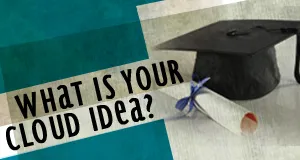Cloud Conclave 2011: Unveiling Top 10 Student Cloud Ideas

We at YourStory.in are extremely happy to share with you the Top 10 student cloud ideas selected from high quality entries received from colleges all across India. Speaking of the students’ cloud ideas, the Amazon team said, “It has been a difficult task to shortlist the Top 10, because so many Indian students have great innovative ideas!”
Here is a list of Top 10 student cloud ideas, in alphabetical order:
Amit N Bhatia, NITIE
Several regions in India are plagued with counterfeit medicine. Amit has proposed that this problem could be reduced by placing scratch cards on medicine bottles. Buyers could then send a SMS with the scratched code to a central cloud server which would verify whether the medicine is legitimate or not.
Anshul Mittal, IIT Delhi
With the proliferation of smart-phones it would become increasingly easier for doctors to utilize the cloud. Anshul’s idea is that doctors could have access to a patient’s medical data at all times using the cloud and they could transmit medical information to a central repository. Additionally, they could conduct remote health data collecting, particularly for disease surveillance, and they could use a cloud based central server to find medical research and analysis.
Arifuddin Ahmed, IIM Kozhikode
With a staggering 10 physicians for every 100,000 people in India, the need for cloud based services in the medical field is crucial. Arifuddin’s idea is that members of health care organizations could use the cloud to send their patients’ clinical data to a database and far away doctors who then could provide reports on the patients’ conditions.
Bhargav Golla, BITS Pilani
Who doesn’t get sick of trying to find an auto? Bhargav’s idea is to design a cloud based service that makes finding an auto entirely automated. A mobile application will use Google maps to triangulate the auto-seeking user. The application and Google Maps could then plot a map to the required destination and send the request to a server. The server would then send the request to the nearest registered auto-driver who could pick up the passenger.
Deepak GR, BMS college of Engineering
Again we see robotics introduced into cloud computing. Deepak has imagined that robots could learn new skills instantly by subscribing to cloud services that offer vast computational data. Additionally, Robots could offload computer intensive tasks such as object detection and face/voice detection in order to reduce their load. For example, map making could be enhanced through the use of multiple robots scanning different regions and then transmitting them to the cloud to create the entire map.
Praveen Kumar Elavarsu, Adhiyamaan College of Engineering
Praveen’s idea is to develop a cloud based medical data architecture that would enable healthcare personnel to access patient data anywhere and at anytime. This would be an easy and efficient way to reduce stored data in different servers and enhance the portability of medical information.
Rajat Goyal, BITS Pilani Goa
Rajat’s semester project may actually enable his idea to become a reality! “Megamind” explores a new interaction method which will build a collective intelligence system by seamlessly transferring data between artificially intelligent robots via the underlying cloud. As the robots learn from each other’s experiences, the intelligence of the system would exponentially grow. The result will be an artificial common consciousness in real time which can be used by any Al System.
Ramakrishna Reddy, Birla Institute of Technology and Science
Agriculture is the backbone of India, yet the majority of farmers are living beneath the poverty line. This is in part due to the gap between farming practices and agricultural research. Ramakrishna proposes a solution to this problem through the use of a cloud based mobile agro-advisory system. Using mobile phones, farmers could access non text based farming information on their mobiles, such as pictures of infected crops, market updates, and innovative solutions from pesticide companies. With the proliferation of smart-phones, this idea could be spread to the medical field as well.
Tushar Gupta, IMT Ghaziabad
Tushar’s idea is that colleges, universities, examination bodies, and other educational institutes could store exam results, certificates, degrees, results, mark sheets and other documents on online databases/clouds. The data for each individual institute would be kept secure, but could be shared as per requirement. Verification of records could be conducted at anytime using unique student IDs. With This type of cloud data base would reduce document loss, eliminate educational document submission, reduce document loss, and create an educational vault for students.
Varun Agrawal, National Institute of Technology
Varun’s concept is to enhance dynamic game-play via the cloud. Data could be collected from users in real time which would cater to each gamer’s individual interests and style. Additionally, Varun has further imagined that the cloud could be utilized to begin the trend of wearable electronics. This would eliminate the need for people to carry around an array of gizmos with them at all times.
And here's the list of Top 5 Cloud Startups selected at Cloud Conclave 2011
Thanks a ton to our readers for supporting us during Cloud Conclave 2011, up next is e-Sparks 2011 - India’s premium E-commerce Showcase






